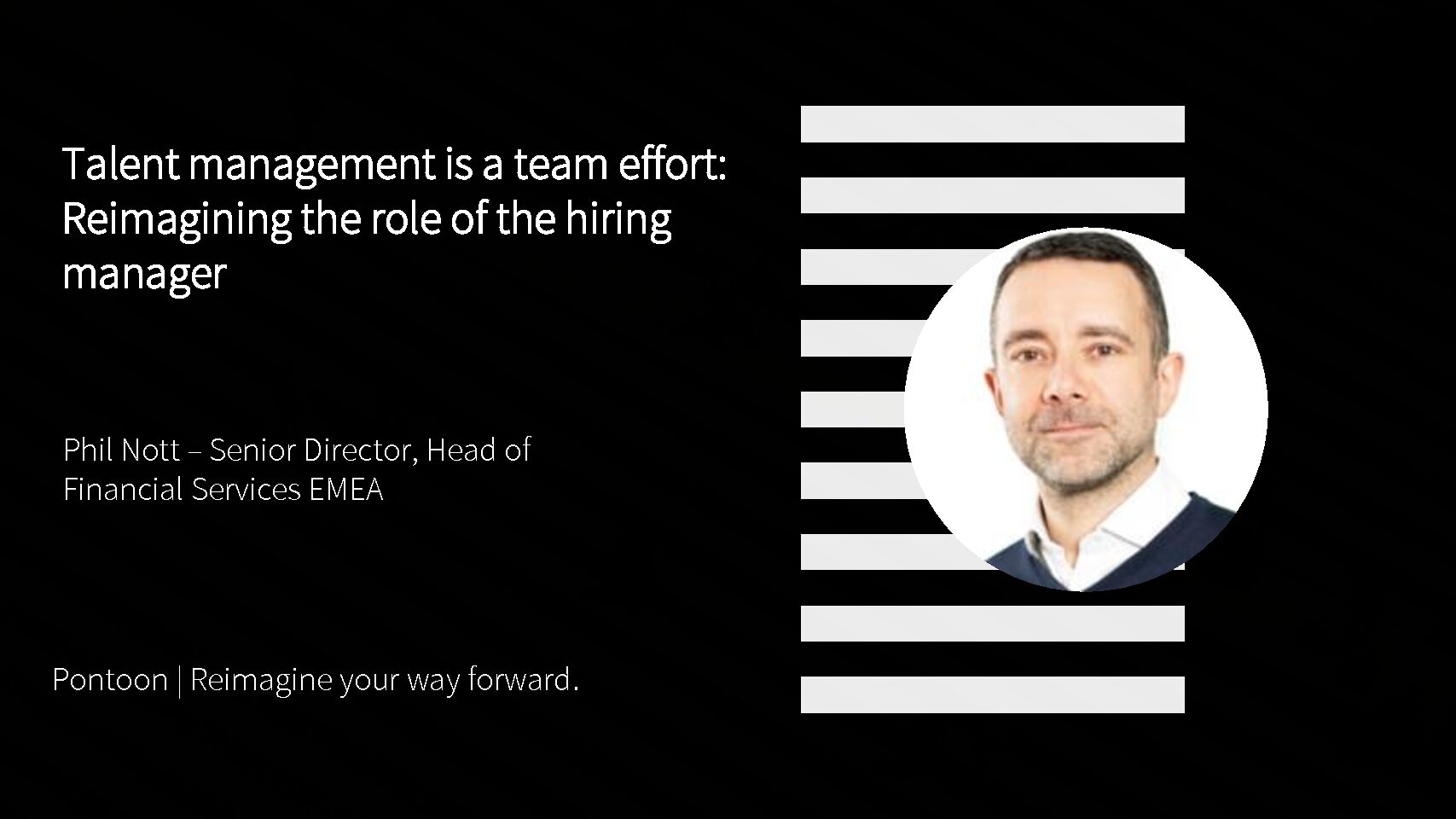5 recruiting strategies for improving the candidate experience
Recruiting strategies: The key to candidate conversion
You’ve done the hard work of gaining interest and buy-in from a candidate and having them apply to an open requisition. That’s an excellent start, but the question is: How to successfully convert an applicant into an employee?

David Molina – VP Global Accounts – Pontoon
Many firms struggle to keep candidates engaged. Most companies face an 80% drop-off rate during their employee application process. It’s critical to understand why these applicants are declining to move forward. Candidates resign for various reasons. These might include inflexible and outdated recruiting technology, lack of follow-up and feedback from unavailable recruiters, and repetitive or time-consuming interview stages. Job seekers in high-demand fields even say they’ve turned down an offer because of a cumbersome hiring process.
5 steps to an elevated candidate experience
How do you create a positive candidate experience during recruitment? Here are five winning strategies that you can use:
Prepare your hiring managers
Hiring managers play an important role in ensuring that their organisation can attract the best talent in the market. To do this, they must be able to effectively “sell” the company to potential applicants. Specifically, they need to present a compelling Employee Value Proposition (EVP) case for why the organisation is an ideal fit.
However, with managers’ focus often placed on hiring quickly, they often don’t have time to build a proper rapport and ultimately determine whether that person is a complete fit. During an interview, managers often concentrate on getting the information necessary to meet the short-term goal of hiring someone. While rushing through this process, they can miss key details about candidates’ long-term potential and how they complement established internal teams and the organisation.
The best way to upskill hiring managers on interviewing techniques is through training sessions focused on appropriate questioning methods. Additional training should focus on company EVP, building rapport with candidates, and understanding the different types of interviews and their unique purposes.
With proper guidance in interviewing candidates, your managers can quickly uncover deeper information about a potential candidate’s background and qualifications. If short on time, offering self-scheduling options to interviewees might be a valuable technique to consider. Allowing candidates to schedule interviews frees up more time for your managers to focus on candidate research and interview preparation.
Personalise communication
Personalised communication makes a big difference in how applicants perceive their experience during the hiring process. Taking time to send creative and customised messages makes candidates feel respected as individuals rather than just numbers in a sea of applicants. If a candidate has been waiting longer than expected for feedback, sending a bespoke text or email message can help alleviate anxiety. It’s good to let them know their application is still being considered.
Of course, communication at the later stages of the process is equally important. Before any virtual interview, hiring managers should research candidates’ previous job experiences, hobbies, and social media presence. This will help create an inviting atmosphere that shows you’re interested in who the candidates are, and not just their qualifications.
During the interview, make sure to ask applicants what sets them apart or makes them unique. This information can be used in a timely follow-up email referencing what was discussed and thanking the candidate for the valuable insight shared. Such a personalised approach will create an atmosphere of respect and trust, making your organisation stand out from the competition.
Keep candidates informed
Informing candidates about hiring deadlines and where they are in the process is critical to keeping them engaged and interested. Research suggests that 96% of candidates will apply for jobs at a company they know will keep them informed during the application process. Candidates become unresponsive or drop out entirely if the potential employer is not responsive. Meanwhile, over 6 in 10 job seekers say they never or rarely ever hear back regarding their applications.
Many candidates are left in the dark during the interview process due to a lack of feedback. Experienced recruiters should prepare candidates by setting expectations, building a relationship, and sharing information to understand selection criteria. Job seekers who feel their time is not respected may be unmotivated to continue and decide against pursuing a role.
If deciding not to move forward with the potential hire, managers need to give actionable feedback. This gives interviewees a chance to understand why they weren’t selected. Even if it’s bad news, timely feedback conveys respect for someone’s time and effort – plus, it gives the person closure. Additionally, employers can offer constructive advice on how the applicant could improve their chances of being hired or recommend another role within the company.
Employers must have a robust and agile governance model to manage and track all communication. At Pontoon, we work with clients to help set clear expectations, escalation paths, and an easy-to-follow roadmap of the candidate journey . This provides quick and smooth access to all key stakeholders and a corrective action plan if needed.
A mobile-first approach
Companies must ensure their recruitment process is optimised for mobile to attract the best possible talent. Failing to do so puts them at a competitive disadvantage as they miss out on potential hires. According to Glassdoor, 35% of job seekers would prefer to apply from their phones.
With the talent pool growing more competitive, companies must ensure their hiring process is accessible and convenient. Talent analytics help find and source untapped talent pools. Mobile-friendly recruitment techniques give employers access to more people, including digitally-native Gen Zers.
Regardless of the industry, having a clearly defined mobile strategy can significantly impact a company’s ability to acquire top talent.
How an experienced RPO partner can elevate your recruitment strategies
It takes time and dedication to discover the right balance between technology and the human touch. That’s why having an experienced partner to help streamline your recruiting process is so important. Recruitment firms, with their market expertise, use advanced screening and sourcing technology to reduce hiring time and improve candidate management.
At Pontoon, our talent advisors partner with clients to help them understand what job seekers want. We implement a personalised approach to improve the candidate experience. With the perfect blend of analytics, advisory services, and process analysis, we create a customised communication strategy focused on keeping applicants informed. We’ll help you identify ideal talent channels and shortlist candidates to ensure you hire qualified and engaged candidates. By reducing the candidate shortlist-to-interview rate, we will decrease your time to fill.
Creating an enjoyable candidate experience should be a top priority for any employer. Personalised communication, keeping candidates informed, and offering timely feedback enhances engagement, boosts retention rates, and attracts top talent, fostering overall business success.
Related Post
The role of hiring managers has drastically shifted amidst the evolving landscape of talent acquisition and retention in recent years. As organisations struggle to attract new talent in a demanding ...




